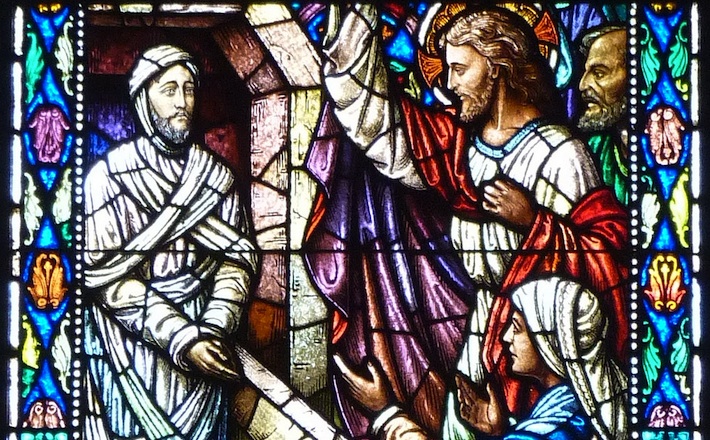Commentary on Isaiah 25:6-9
In this remarkable passage, the Lord prepares a lavish feast at the Lord’s own sacred mountain.
All peoples are invited: oppressors and oppressed, powerful and lowly, native and foreigner (Isaiah 25:6). The host of such a feast can only be a king.
In the ancient near eastern world, such feasts provided opportunities for mighty rulers to display their wealth and power, foster loyalty, communicate their protection and providence, negotiate treaties, and render judgments. The feast was a hallmark of empire. But the shared meal also has a sacred and intimate character. It brings pleasure and satisfaction. It engages the senses. It establishes and strengthens relationships.
At this feast, God’s lordship, providence, and power are on display. God is preparing to judge and to save. But God does it in a way utterly unlike any earthly royal host. The Lord does not partake of the rich meats and aged wine that the Lord has offered to the guests. Instead, the Lord’s mouth opens wide to swallow the veil that covers the peoples, the woven cloth that is woven upon the nations. And finally, the Lord swallows death.
This image startles. A cloth is not food. It does not nourish. And how can death bring life? Why has the host chosen such a meal? What is its significance?
Elsewhere in the Old Testament, swallowing and death are frequently found together. Moses sings of the Lord’s victory over the Egyptian armies: “you stretched out your right hand, the earth swallowed them” Exodus 15:12). In Moses’s graphic portrayal of divine victory and deliverance, the earth represents the ground that opens to receive the bodies of the dead. By extension, it also symbolizes the netherworld (Proverbs 1:12). Earth thus becomes a metonym for death itself. When earth “swallows” in this passage, we can also picture the gaping maws of death opening wide to devour the living.
A similar occurrence of this metonym is found in the book of Numbers. Following the rebellion of Korah, Dathan, and Abiram, Moses instructs the people that “if the LORD creates something new, and the ground opens its mouth and swallows them up, with all that belongs to them, and they go down alive into Sheol, then you shall know that these men have despised the LORD” (Numbers 16:30). The earth swallows bodies and belongings alike (Numbers 16:32; see also 26:10; Deuteronomy 11:16; Psalm 106:17), enacting by this swallowing an irreversible divine judgment against those who have rebelled.
But in Isaiah the Lord does not swallow people. Instead, the Lord swallows “the shroud that is cast over all peoples, the sheet that is spread over all nations” (Isaiah 25:7). The English word “shroud” evokes death, while “sheet” evokes sleep. Yet the words in Hebrew have other connotations. The first word in this pair is literally a veil or covering, while the second refers to something that is woven. Using artful repetition and sound-play, the poet-prophet refers to the “covering that covers” and the “weaving that has been woven.” We can see that they are metaphors, but what is meant by them?
We can take a cue from the third item that the Lord swallows, death itself (Isaiah 25:8), and ask, how are a veil, or a covering, and a woven cloth, related to death? Are they simply the death shroud, as the NRSV suggests? Or can they mean something more? Perhaps the imagery is meant to convey that the nations have been veiled in a way that renders them blind to the Lordship of God, or they have imagined themselves to be covered, that is, protected, from divine judgment. The image of weaving evokes a luxurious commodity, suggesting that by privileging material prosperity the nations have chosen for themselves a living death.
To swallow is to consume utterly, leaving no trace behind. In removing the covering, the veil, and the luxurious curtain, the Lord erases every false story the nations have told, every false security, every destructive value. The nations are then truly ready to be judged or to be saved.
To swallow is also to take something into one’s own body. When the Lord consumes death, the Lord rearranges the cosmic geography. Death no longer resides in the underworld, the earth, or the deep. God has taken death into God’s own self. Circumstances that seemed to spell final destruction for God’s own people no longer have the power to end the life of God’s people. God de-creates the order of life and death and makes possible a future for God’s people beyond death and destruction.
The royal feast of judgment thus becomes for Israel a day of salvation (Isaiah 25:9). God wipes away the tears from every face and removes his people’s reproach (25:8). These details remind us that death was present at God’s feast. It was not simply a dish set before the King. Death and suffering were heavy on the heart of God’s guests, who came with mourning and weeping. God’s people carried with them the shame of insults hurled at them by the very nations with whom they now shared wine and rich food.
The royal feast on God’s mountain is an event both sacred and political. At the passage’s conclusion, the fate of the nations is unclear — perhaps they, like death, are also swallowed up. Perhaps they are redeemed. Perhaps they too are invited to rejoice in the Lord’s salvation. But if so, they have had to abandon much that was familiar in order to remain at God’s table.
Preachers today might ask, how is the Eucharist simultaneously a feast of judgment and salvation? What does it mean for us today to say that God has swallowed death, the veil, and the woven cloth? Help your congregation to know the cost and comfort of releasing death and claiming new life at God’s banquet table. Help them to say, “This is the Lord for whom we have waited, let us be glad and rejoice in [God’s] salvation” (Isaiah 25:9).


November 1, 2015